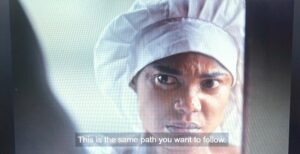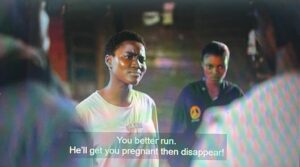One of the major highlights from the movie “Gangs of Lagos” was the different bereavement scenes. Most of the characters lost their loved ones and family at some point. However, how they all reacted to the loss, recover from the shock and coped with the grieve varied.
In this article, we’d explore some health and wellbeing lessons to take away from this blockbuster movie.
PTSD from death/loss of loved ones: The case of 2 mothers
Akande aka Obalola’s mum (Iyabo Ojo), after losing her husband became so overly protective of her son. Wanting to do everything within her power and means, to ensure he doesn’t end up like his father. We see from her character that she was so blinded by grief, bitterness and pent-up anger from not (mentally) addressing the effect of witnessing the cold murder of her husband at a younger age, as well as the aftermath of his death. This trickled down into the “extreme religious practice” and “tough love” that eventually drove her son into the arms of those she desperately wanted him to stay away from, years later. Which further translated on into how she disconnected when the boy left, and how she reacted when the boy tried to reconnect with her 16 years later. She did not only become a young widow, but this led to her being an absent mother.


On the other hand, Ify’s mum (Chioma Chukwuka), who also lost her husband around the same period to the same circumstances as Iyabo Ojo (although the scene wasn’t shown), regardless stayed optimistic and remained present through the course of Ify’s life and untimely death.
We see this in scenes where Akinwale a.k.a. Nino would take the kids to her place for meals after school and he would give her money for their upkeep. Even after things went south and the kids became Kazeem’s (collector or errand boys), we see how she relates with her son in the market. Supporting him and making lemonade of the lemons life has thrown at her. We also see how she accepted his baby and baby mama, even naming the Newborn after her late husband.


Eventually, after Ify’s death, she revisited the issue surrounding her husband’s (Ify’s father) death. Her heart felt speech at Ify’s burial showed she had gone through the 5 stages of grief for her husband’s death nicely. As opposed to her counterpart (Akande’s mother), who rather almost laid a curse on her son, decided to leave and stayed gone.
Lesson from a mental health and wellbeing point of view:
Although they looked physically healthy, both women had suffered posttraumatic stress disorder (PTSD) following the death of a loved one. However, how each person responded or managed this mental health issue affected their outlook on life, their relationships with their sons, their quality of life and general outcomes as well. Hence, we all should take our mental wellbeing seriously. In as much as people grief differently, professional help and adequate support systems should be made available. Especially for young widows with babies, who find the recovery process and gaining balance harder.

Unplanned pregnancy: Actions and consequences
The story line that tackled this, is that of Blessing (Funke Williams) and Ify (Chike-Ezekpeazu Osebuka). Blessing got pregnant, which was unplanned by the couple and initially unwanted by Ify. Following the intervention of friends and acceptance by family, the child born became wanted – albeit unintended – with the hope that his father would “blow” and move them all out from the “trenches”. However, as they say – nothing good lasts long in Isale Eko. Ify died, and everything turned around abruptly. Blessing who only came into the picture because of an unplanned unintended pregnancy, became intrinsically caught up in the web of thuggery violence, gangsterism and street fights. Now, not because she has a choice. But largely because, she now needs to continually fight for the life of her child – who no longer has a father and is “stuck in the trenches” with her.

Lesson from a reproductive health and life planning point of view:
All these could have been avoided with appropriate use of contraception. As a young beautiful lady with her whole life ahead of her, she didn’t need to be caught in that life of uncertainty. When she could have consciously planned to lead a better life, by making informed choices. Family planning is Life planning.

Community healthcare: Availability and functionality
Isale Eko, like most place in Lagos – is the absolute ghetto with a high tendency for recurring gang clashes and street fights. These usually result in a lot of morbidity and mortality from the different types of injuries sustained from these conflicts. Some could be open injuries or closed, superficial or deep, some might retain all body parts, while others loose some. However, a common intervention needed by all – is a prompt and highly functional health care and emergency response within the community.

Some of the basic lifesaving procedures to offer may include: first aid to either stop bleeding or dress wounds, stitch or suture wounds, apply cast appropriately, resuscitation with fluids replacement and so on. Which are palpably absent, inaccessible or unaffordable to the common man in most of the community facilities and primary healthcare centres (PHCs) in these culprit areas. Leading to more preventable deaths and ill-health, especially among the population at risk i.e., middle-aged men working in parks and transportation, young people belonging to gangs, vagrant adolescents etc.

Bonus Lesson:
Public Private Partnerships (PPP) has been found to increase the functionality of community PHCs, as well as provide such services in terms of swift emergency response, mobile clinics and so on. This is your cue to invest in PPP and healthcare financing for provision of quality healthcare in communities.
Editor’s note:
This article was written by Mary Oluwakemisola Agoyi as a sequel to the initial movie review by a colleague. Images used were gotten from relating scenes in the Gangs of Lagos Movie.



